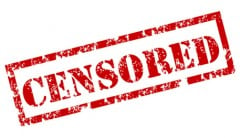SOPA Clearly Isn’t the Answer to Online Piracy
I honestly don’t fully know the best way to combat online piracy; but I do know that the Stop Online Piracy Act (SOPA) isn’t it. The bill would create a plethora of problems if it were passed. Let’s be real here, copyright infringement and piracy are real problems that need real solutions, but when you spot a weed growing in your front yard, do you dig up the entire lawn to get rid of it? No, you pull that weed, and ONLY that weed, out of the ground and you do your best to monitor the lawn for any future weeds.
User-Generated Content Sites and SOPA
One of the complaints that you’ll consistently hear about the SOPA bill is that it is way too generalized and all-encompassing. For instance, under SOPA, a site will be considered dedicated to the theft of U.S. intellectual property if it is “primarily designed or operated for the purpose of offering services in a manner that enables or facilitates copyright infringement”. Well, take YouTube for example; the online video site serves an average of 100 million videos every single day. The majority of it is uploaded by users, who can remain anonymous with minimal effort if they so choose. Under SOPA, YouTube can be considered a site that is primarily designed in a way that enables copyright infringement because of those reasons. Totally nuts. Blog owners might find themselves harboring illegal content through RSS, and pay the price for it; who knows anymore? If you give umbrella-like power to the government, then they will abuse it; history has taught us this much. Sites like YouTube, Vimeo, Wikipedia, and Facebook have immeasurably reinvented this country, and the world; putting them in the line of fire is just unfair and wrong.
Guilty by Association: Pirate Bay and Other “Dirty” Websites
Make no mistake, the Swedish Bit-torrent website Pirate Bay is certainly a major target of the SOPA effort. The owners have consistently thumbed their noses at the Motion Picture Association of America (MPAA) and the American copyright laws. All efforts to shut it down permanently have failed, and it still operates with impunity; a fact that certainly infuriates the MPAA. If SOPA was passed, then technically just by linking to The Pirate Bay in an article or news story could be considered “facilitating copyright infringement” and earn you a court order and possible prosecution. Surely, there has got to be a better way to do it.
SOPA and Small Businesses Startups
Under SOPA, small startups would be severely negatively affected. The possibility of being prosecuted just for doing business with, or linking to another business that is found to be committing copyright infringement, creates a whole new set of obstacles for any startup. There will be legal concerns, and the need to constantly police ever single piece of communication and content that goes out their doors. All of that takes more money, and lots of it. Not to mention that it would create paranoia at the very top, and choke creativity as it trickles down. Maybe if we were in Iran this would seem perfectly normal, but we’re not.
In its current form, SOPA is certainly a disaster, and quite possibly beyond help regardless of how many times it’s amended. The government and entertainment industry should not run the Internet; but they could start by going after the criminals who are actually perpetuating this problem. The Online Protection and Enforcement of Digital Trade Act (OPEN) isn’t perfect either; but it is a step in the right direction. The bill places the enforcement in the hands of intellectual property experts, the US International Trade Commission, and not the Justice Department. Also, it places a strong emphasis on going after the money involved in online piracy. After all, the reason piracy is committed is financial gain. Shut down their site, they’ll get another site. Take away their money, and you’ve scored a huge blow; guaranteed.


